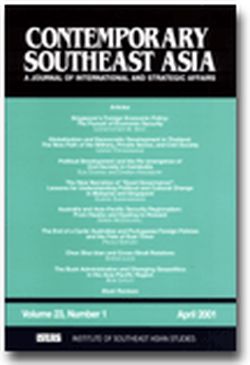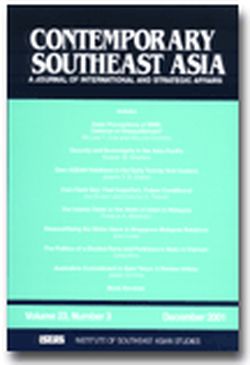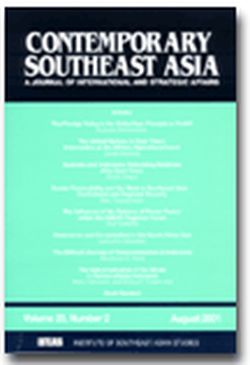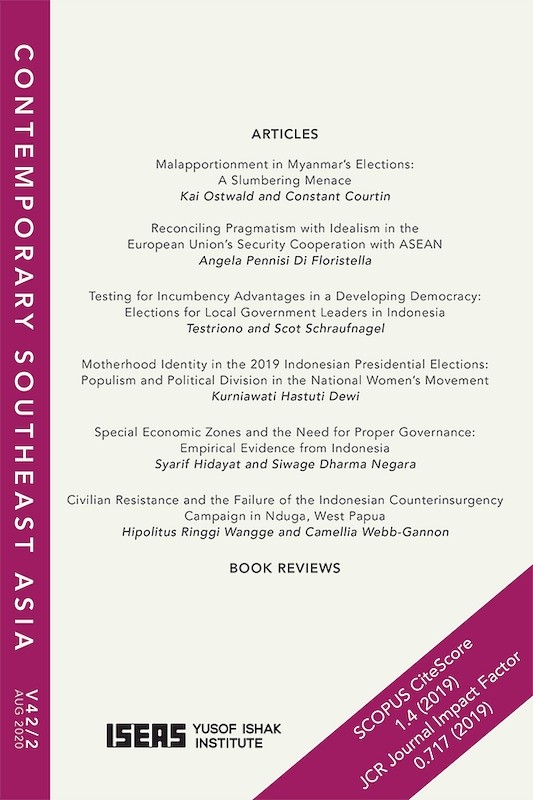Contemporary Southeast Asia: A Journal of International and Strategic Affairs Vol. 23/1 (Apr 2001)

Date of publication:
May 2001
Number of pages:
187
Code:
CS23/1
About the publication
An internationally refereed journal that specializes in the politics, international relations and security-related issues of Southeast Asia and the Asia-Pacific.
Contents
-
Preliminary pages
- ARTICLES
-
Singapores Foreign Economic Policy: The Pursuit of Economic Security, by Christopher M Dent, author see abstractSingapore has maintained one of the most effective foreign economic policies (FEP) of any small state, with the city-states proactivity in the domain of economic diplomacy demonstrated at multiple levels. This article contends that Singapore's fundamental FEP objectives are oriented by its pursuit of economic security. Various key determinants of Singapore's foreign economic policy are presented in setting the general context to the main discursive analysis. In addition to various geo-economic and state-centred factors, Singapore's deep security complex forms a crucial determinant in this respect. A framework for economic security analysis within the FEP context is developed and then applied to Singapore's case.
-
Globalization and Democratic Development in Thailand: The New Path of the Military, Private Sector, and Civil Society, by Ukrist Pathamanand, author see abstractThis article examines the interrelationship between globalization and democratic development by studying three of the main actors in the Thai political economy: the military, the private sector, and civil society. The article examines how their roles have changed in the context of globalization in the 1990s. It then looks briefly at how these changes have impacted on both the form and content of political activity in Thailand at the start of the new millennium, particularly as exemplified in the results of the general election on 6 January 2001. During the 1990s, civil society in Thailand had become stronger and was able to challenge the old socio-political order, while the military was simultaneously tamed. At the same time, however, "money politics" the merging of profit-seeking and power-seeking has become stronger. The victory of the Thai Rak Thai party in the January 2001 general election signals a new and more sophisticated conjunction between the private sector and politics.
-
Political Development and the Re-emergence of Civil Society in Cambodia, by Sue Downie, Damien Kingsbury, contributors see abstractSince the United Nations Transitional Authority in Cambodia organized multi-party elections in 1993, there had been a gradual shift away from various authoritarian forms of government towards limited political development. Setbacks in this political development included the Cambodian Peoples Party asserting itself in government between 1993 and 1998 despite holding fewer seats than FUNCINPEC. Secondly, the government demonstrated it had not separated powers nor embraced respect for human rights, and continued to use violence or military rather than civil means for conflict resolution. This last point was illustrated by the March 1997 grenade attack and the July 1997 fighting between the two parties. However, the 1998 multi-party elections and the growth of civil society indicate that there has been noticeable political development in Cambodia.
-
The Dual Narrative of "Good Governance": Lessons for Understanding Political and Cultural Change in Malaysia and Singapore, by Surain Subramaniam, author see abstractThe narrative of good governance has become particularly relevant in understanding political and cultural change in Malaysia and Singapore. This study shows that the narrative of good governance is a double-edged sword that is, it can be used in rather contradictory ways. In the case of Malaysia, good governance assumes the role of a reformist discourse adopted by opposition forces to pressure the ruling regime into introducing liberal democratic reforms. In the case of Singapore, good governance plays the role of a dominant discourse employed by the ruling lite as a defense against liberal democratic reforms. Not only does this seem to suggest that the relationship between democracy and good governance is a complex one, it also puts some of the recent political and cultural developments in both these cases in a new context.
-
Australia and Asia-Pacific Security Regionalism: From Hawke and Keating to Howard, by Derek McDougall, author see abstractBoth the Hawke and Keating Labor governments (1983-96) gave some attention to the development of Asia-Pacific "security regionalism" as a means of strengthening the regional focus in Australias security policies. While the rhetoric has changed, in terms of substance the Howard coalition government has continued many of the policies of its predecessor. At the same time, this government has had to adjust to the changed circumstances in Indonesia, and particularly the crisis in East Timor. Papua New Guinea, especially Bougainville, has been a concern for both governments; new problems have also arisen in Fiji and the Solomon Islands. The emphasis on security regionalism complements the continuing importance of Australias security relationships with both the United States and New Zealand.
-
The End of a Cycle: Australian and Portuguese Foreign Policies and the Fate of East Timor, by Paulo Gorjao, author see abstractBefore 30 August 1999, East Timor had been for a long time an unfinished issue on the international agenda. This situation resulted from Indonesia's decision in December 1975 to proceed with a military and political incorporation without an act of self-determination recognized by Portugal and the United Nations. In different ways, during the past twenty-five years the foreign policies of Australia and Portugal had to deal domestically and internationally with the Indonesian fait accompli. As time went by, it became clear that "the question of East Timor" would only disappear with the end of the Indonesian authoritarian regime itself. On 27 January 1999, President B.J. Habibie opened a political window of opportunity, when he decided to allow a popular consultation in East Timor. Canberra and Lisbon could finally correct the mistakes committed in the past.
-
Chen Shui-bian and Cross-Strait Relations, by Sheng Lijun, author see abstractThis article discusses Taiwan President Chen Shui-bian's China policy and the impact this has on the cross-strait relationship. Chen is unlikely to deviate from the pro-independence stand of the Democratic and Progressive Party (DPP). For the short-term, Beijing has good reason not to use force, but resorts to both well-calculated pressure (on the DPP) and concessions (to the opposition), in the hope that this may eventually weaken the DPP. This "neiwai jiaokun" (internal trouble and external pressure) may emasculate Chen's will and ability to push for independence. Even a declaration of independence by Taiwan, if without U.S. support, will be manageable to Beijing, which has been psychologically, politically, and militarily prepared for such a contingency. The declaration can only pose a threat if it is used by a major foreign power for other objectives. Therefore, the Chinese reading of U.S. strategic intentions is crucial in deciding what action China will take on Taiwan.
-
The Bush Administration and Changing Geopolitics in the Asia-Pacific Region, by Bob Catley, author see abstractThe new U.S. Administration, under President George W. Bush, will face opportunities and challenges in re-orienting U.S. diplomacy according to some new concepts its officials espouse. The East AsiaPacific region is still in transition from a Cold War bipolar structure to a regional system whose structures and parameters are not yet fully defined. In the main, as globalization replaces the Cold War, economic relations have supplanted strategic dimensions as the main priority in relations between states. Appropriate diplomacy now could enable a regional security architecture and institutional structure to emerge and secure greater stability for some time. Whether this will occur is far from clear.
- BOOK REVIEWS
-
BOOK REVIEW: Interpreting China's Grand Strategy, Past, Present, and Future. By Michael D. Swaine and Ashley J. Tellis, by Yongjin Zhang, author
-
BOOK REVIEW: Chinese Society: Change, Conflict and Resistance. Edited by Elizabeth J. Perry and Mark Selden. London and New York: Routledge, 2000. 249pp., by Che-po Chan, author
-
BOOK REVIEW: Ethnic Minorities and Nationalism in Southeast Asia. Edited by Thomas Engelbert and Andreas Schneider. Frankfurt am Main: Peter Lang, 2000. 194pp., by Victor T King, author
-
BOOK REVIEW: Asian Nationalism. Edited by Michael Leifer. London: Routledge, 2000. 203pp., by Lee Hock Guan, author
-
BOOK REVIEW: Exiting Indochina: U.S. Leadership of the Cambodia Settlement and Normalization with Vietnam. By Richard H. Solomon. Washington, D.C.: United States Institute of Peace Press, 2000. 116pp., by Jesse Cortes, author
-
BOOK REVIEW: Totalitarian and Authoritarian Regimes. By Juan J. Linz. Boulder, Colorado: Lynne Rienner Publishers, 2000. 343pp., by Ronald A Francisco, author






